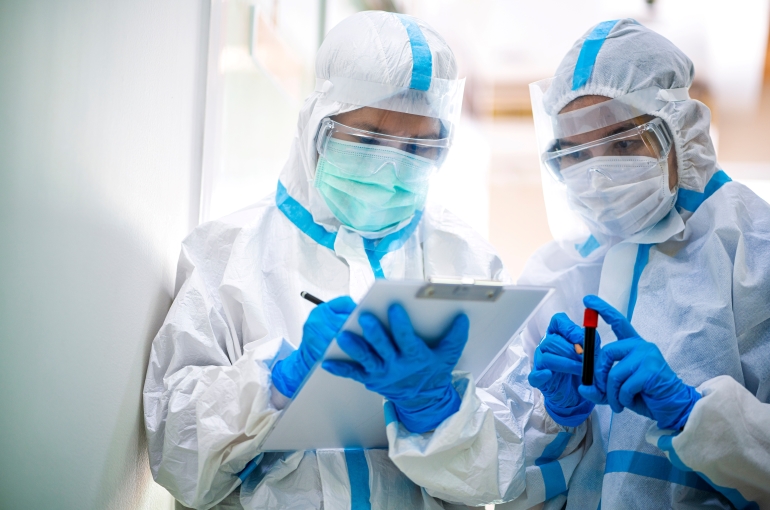
From the lab to the NHS frontline
When the coronavirus hit, Dr Ricky Vaja swapped his lab coat for scrubs and returned to the NHS frontline. He tells us about his experience and what he’s learned.

The Covid-19 pandemic has brought challenges to the BHF and our researchers, as it has to many others. When the first national lockdown started in March 2020, many researchers had to pause their studies. Research institutions were closed, and clinical trials with patients were put on hold as frontline care and Covid-19 research were prioritised.
We supported BHF-funded researchers to redirect their expertise to the global battle against Covid-19, and BHF research centres were able to reallocate funds to Covid-19 research. From lab scientists working in Covid-19 testing centres, to clinicians being redeployed to the NHS, to researchers leading new Covid-19 studies, we are proud of every contribution.
One of the many BHF funded researchers who swapped a lab coat for scrubs to help the fight against Covid-19 was BHF Clinical Research Training Fellow Dr Ricky Vaja, who previously trained as a cardiothoracic surgeon. His research is focused on studying possible links between ibuprofen and heart attacks. From March to August 2020, with his BHF-funded studies paused, Dr Vaja worked in intensive care, helping to treat those with severe Covid-19 complications. He also used his surgical skills to help tackle the waiting list of heart surgeries postponed due to the pandemic.
At the start of the pandemic, BHF-funded researchers at University College London helped initiate a study called COVIDsortium. Samples of blood, saliva and nasal swabs were collected from healthcare workers in three London hospitals to help answer key questions about the virus and its spread.
One of the areas they investigated is whether becoming infected with the coronavirus that causes Covid-19 offers lasting protection against the virus. It had been unclear whether your immune response would help to prevent you from catching the virus again, particularly if you had an asymptomatic or mild infection. The researchers found that they could detect antibodies and immune cells that could help protect against reinfection at least four months later.
More recently, the team have also been looking into how the immune response to being infected could affect the immune response to the coronavirus vaccines. Their early results, looking at the immune responses in 51 healthcare workers who had received the Pfizer/BioNTech vaccine, suggest that people who have previously tested positive for the virus have a stronger immune response to the vaccine than those who haven’t had the virus. While this is a small study and further research is needed, this raises the possibility that people who have had the virus might only need one dose of the Pfizer/BioNTech vaccine.
There was an urgent need to learn whether Covid-19 could cause heart damage, and our researchers sprang into action.
In July 2020, a study led by BHF fellow Professor Marc Dweck and colleagues at the University of Edinburgh showed that around half of 1,216 patients who had an echocardiogram while hospitalised with Covid-19 showed abnormalities in their heart function. Then, in February 2021, another study led by Professor Marianna Fontana, BHF Fellow at University College London, looked in more detail at MRI scans of the heart from people recovering from severe Covid-19 to understand the extent of damage. This study specifically looked at people hospitalised with severe Covid-19 who had raised levels of troponin in their blood. Troponin is released into the blood when the heart muscle suffers an injury (for example a heart attack). They found that around half of the 148 patients involved had evidence of damage to their heart up to a month after being discharged from hospital – but importantly, these findings do not apply to people with less severe Covid-19.
These studies are important evidence that heart scanning can be used to help identify patients who may need heart treatments to help their recovery from Covid-19. In addition, they highlight the need for ongoing research to better understand how Covid-19 can damage the heart, whether these effects can last longer into recovery, and develop ways to prevent and treat this damage.
BHF-funded researchers have also been redirecting their expertise to investigate potential treatments for Covid-19 and its complications.
Professor Mauro Giacca at King’s College London has been working with researchers at the University of Trieste, Italy, to investigate how the virus that causes Covid-19 damages the lungs. In November 2020, they found that the spike protein on the surface of the virus can disrupt the normal structure of the lungs by causing lung cells to fuse, forming abnormally large cells. Before the pandemic, Professor Giacca and his team were using robotic technology to identify potential treatments for heart attack and heart failure. They’ve been able to reuse this technology to screen thousands of existing drugs to see whether they could block the lung damage caused by coronavirus infection.
First published 1st June 2021